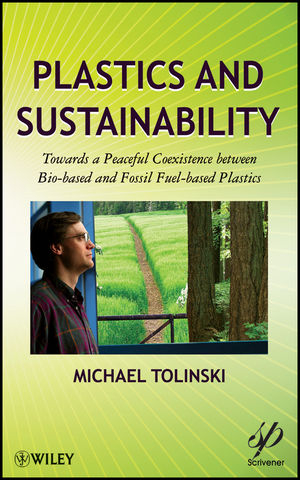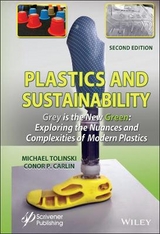
Plastics and Sustainability – Towards a Peaceful Coexistence between Bio–based and Fossil Fuel–based Plastics
John Wiley & Sons Ltd (Verlag)
978-0-470-93878-2 (ISBN)
- Titel erscheint in neuer Auflage
- Artikel merken
Clearly lays out the issues related to plastics' effects on the environment, while also serving as a practical, non-academic guide for making sustainability decisions about plastics recycling and the newest bio-based plastics Company managers, product developers, policy makers, environmental researchers, and plastics industry engineers are under increasing pressure to find ways of minimizing the environmental footprint of plastic products. This accessible book is designed to help readers understand the life-cycle impacts of various plastics, clarifying the technical research and practical arguments to show when bio-based and recycled plastics might be useful options for reducing the overall energy consumption, greenhouse gas emissions, and waste associated with traditional plastics. Plastics and Sustainability compares traditional fossil fuel-based plastics with bio-based plastics in terms of properties, environmental impacts, and costs -- indicating what the most effective approaches could be for using recycled, biodegradable, or various bio-based materials.
The book makes objective comparisons between bioplastics and all commonly used plastics, focusing on how they affect production economics, product requirements, and retailer and consumer needs. It incorporates research concerning life-cycle assessment, production techniques, and commercial applications, and presents "green" guidelines about product design, recycling, processing efficiency, and material selection. The book also reports on recent industry developments and commercial trends in an effort to synthesize conclusions that are necessary for finding the right balance between bio-based and fossil-fuel based plastic products. Check out the author's blog at http://www.plastech.biz/blog.
Michael Tolinski has been researching and writing about plastics sustainability issues for industry readers regularly since 1998 (and since 2004 as a contributing editor for Plastics Engineering magazine published by the Society of Plastics Engineers). His materials science and engineering degree and previous career as a manufacturing/materials engineer has given him a solid background in plastics and in the practical problems faced by manufacturers. His first book, Additives for Polyolefins, was published in 2009.
Acknowledgements xi Preface xiii 1. General Introduction 1 1.1 What is Environmental Sustainability? 4 1.2 Facing the Contradictions of Plastics 8 1.3 Plastics at Play in Consumer Lifestyles 10 1.4 Controversies Concerning Plastics: Recent Examples 11 1.5 The Desire to be Green 19 1.6 The Course of This Book: A Chapter-by-Chapter Overview 26 2. The Life Cycles of Plastics 31 2.1 Green Principles A basis for Discussion 26 2.2 Life Cycle Assessment (LCA) A Baseline Tool 33 2.3 Plastic Lifetimes: Cradle-to-Gate to Gate-to-Grave 46 2.4 Towards a Hierarchy of Choosing Plastics for Sustainability 66 References 68 3. Polymer Properties and Environmental Footprints 73 3.1 Background on Polymers and Plastics 75 3.2 Common Commodity Thermoplastics 82 3.3 Traditional Engineering Thermoplastics 95 3.4 Traditional Thermosets and Conventional Composites 100 3.5 Biopolymers: Polymers and Biological Origin 104 3.6 Additives and Fillers: Conventional and Bio-based 116 3.7 Concluding Summary 125 References 126 4. Applications: Demonstrations of Plastics Sustainability 133 4.1 Trends in Sustainable Plastics Applications 136 4.2 Sustainable Plastics Packaging 137 4.3 Sustainable Plastics in Building and Construction Plastics 146 4.4 Automotive Plastics and Sustainability 151 4.5 Specialized Applications and Plastics Sustainability 158 4.6 Conclusions about Sustainable Plastics Applications 162 5. Design Guidelines for Sustainability 169 5.1 Green Design Principles 172 5.2 The Wildcard: Consumer Preferences in Green Design 183 6. Sustainable Considerations in Material Selection 187 6.1 A Broad Example of Material Selection: Plastics vs. Metals and Glass 191 6.2 Material Selection for Common High-Volume Plastics Applications 193 6.3 Bio-based Plastic Selection 202 6.4 The Selection Process: A Visual Approach 214 References 219 7. Processing: Increasing Efficiency in the Use of Energy and Materials 221 7.1 Optimizing Resin Recycling 223 7.2 Optimizing Resin Recycling 223 8. Conclusion: A World with (out) Sustainable Plastics 241 8.1 Trends Affecting Future Global Plastics Use 244 8.2 Future Progress Partnerships, Standards, Industry Practices, and Public Education 256 References
| Erscheint lt. Verlag | 2.12.2011 |
|---|---|
| Verlagsort | Chichester |
| Sprache | englisch |
| Maße | 166 x 245 mm |
| Gewicht | 612 g |
| Themenwelt | Naturwissenschaften ► Biologie ► Ökologie / Naturschutz |
| Naturwissenschaften ► Chemie ► Organische Chemie | |
| Technik ► Maschinenbau | |
| ISBN-10 | 0-470-93878-1 / 0470938781 |
| ISBN-13 | 978-0-470-93878-2 / 9780470938782 |
| Zustand | Neuware |
| Informationen gemäß Produktsicherheitsverordnung (GPSR) | |
| Haben Sie eine Frage zum Produkt? |
aus dem Bereich



